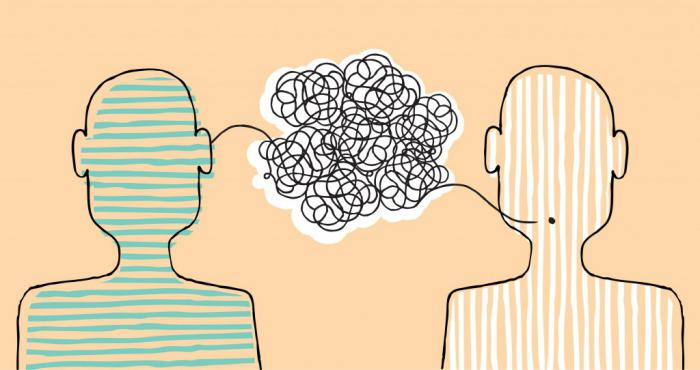Teacher
Professional
- Messages
- 2,670
- Reaction score
- 814
- Points
- 113

How to build trust and gain understanding in dealing with people.
I explain in Russian.
This material can be used both for cognitive purposes and for teaching purposes.
The relationship between people is based on centuries-old psychological mechanisms, the knowledge of which allows you to control the process.
You started communicating with another person.
His attitude towards you and what you say can be described by two groups of criteria:
- Confidence.
- Attention.
- Agreement.
- Openness.
- Willingness to learn.
- Astonishment.
- Joy.
- Adoption.
- Doubt.
- Abstraction.
- Dispute.
- Stealth.
- Desire to teach.
- Contempt.
- Fear.
- Rejection.
Sometimes, we meet them, sometimes others.
Before studying NLP, we said in both cases something like this - well, he is such a person, what to do / and that's great.
In other words, we thought that his attitude towards us depends on some circumstances in the surrounding world, and we have almost no influence on this.
We got a client from the second category - he is such a thing to do.
Or, there was a person who was always in communication with us from the first category, but today he somehow moved more into the second. Well, apparently, he has such a day.
We didn't manage it in any way. Although I do not insist.
Let's allow ourselves a small digression into neurophysiology.
Our brains are simply littered with special cells called mirror neurons.
What are they mirroring?
Scientists have found that these neurons began to appear in monkeys at a time when they began to use the simplest tools.
For example, a stone with which you can chop nuts.
Unlike the ability to climb trees, move around, grab fruit, peel and eat, hide from predators, feed a baby - wielding a stone is not an innate skill that has been used by hundreds of generations of ancestors.
In order to learn this from another, one must exactly repeat his behavior.
This is where mirror neurons come to the rescue. They allow you to copy behavior in the learning process.
Today, human mirror neurons have two more functions:
- Empathy is the ability to feel what is happening to another person.
When a loved one is upset, you not only understand this, but in some cases feel upset.
- Guessing intention is the ability to understand what a person will do next, based on some elements of behavior.
Thus, the work of mirror neurons is associated with learning, copying and understanding another person.
It is also important to say that most of these neurons are disabled, otherwise we will uncontrollably feel all the time what others are feeling and repeat after them. This means that mirror neurons can turn on and off.
Now back to our two column friends.
Each person has a unique model of the world.
This is a set of rules and laws of this world, with which a person agrees and believes in their truth.
In NLP, this is called a map.
The map contains everything that we know and think about ourselves, other people and the world in which we live.
One person's card is very different from another's. But there are similarities in them.
One of them likes to walk in cloudy weather, the other does not.
But both believe in life on Mars.
It turns out that if we start communicating with a person, and in the first minutes we somehow present similar parts of the map to each other, then our states begin to strive for the criteria from the first category.
If we saw the differences, the elements of the second appear.
The complex of states and conditions of perception, described in the first column, is called Rapport.
Experienced psychotherapists intuitively came to the conclusion that it was not worth relying on chance, and in communication with the client they began to demonstrate similarities in the cards.
And this caused rapport.
Observing them, the creators of NLP noticed this trick and studied the process thoroughly.
The process of deliberately demonstrating similarity with the interlocutor was called adjustment.
If you adjust to the interlocutor, rapport will come, and he will begin to trust us, agree, accept some of our ideas in the future, even if he previously denied them.
He will begin to show interest in us and our ideas, he will be surprised and pleased by the things that we tell him, and he will be ready to expand his map - to learn something from us.
You have cases in the past when you heard something like - in fact ... from a trusted person ... And after that you began to believe that it was so.
The fact is that all processes in our brain are bidirectional.
If we are having fun, we smile.
If we smile on purpose, after a while we will have fun.
This trick is used by professionals.
If a person learns from us, and his mirror neurons are active in relation to us, he copies us.
If we copy a person, then for his subconscious mind there is no difference, we copy him or he us. There is a fact of similarity that causes the triggering of mirror neurons and all related events. There is rapport.
Great news. It remains to figure out how you can adjust, and we are on a horse. In dealing with any interlocutor, his state of trust or distrust now depends on our behavior.
You can adapt to behavior, or you can adapt to speech. Let's consider the main types of tuning.
- Adjustment to body position.
This should be done imperceptibly. Therefore, I give a recommendation.
Change your body position the moment you start speaking.
It looks natural. Verbal activity appeared, and activity in the body appeared.
If he is standing, his hand rests on the table, do the same, and this will be an adjustment.
- Tuning to the voice.
The most important thing for tuning is voice speed. And it's easier to manage than height.
The fact is that our speech is the translation by the brain of internal images, sounds and feelings into words. Each person carries out this process at his usual speed. Some are faster, some are slower. And this is reflected in the speed of the voice.
If you speak to a person faster, he does not have time to translate your words into images, sounds and feelings. If you speak more slowly, he is stressed by the excessive anticipation of information. And if you speak with his speed, you not only show his subconsciousness the similarity, than adjust, you also facilitate the process of understanding him, which causes positive emotions.
Moreover, the fast voice is automatically louder and the slow one is quieter, which provides an adjustment to the volume.
If your voice is fast, sit up straight or lean back in your chair; if it is slow, rest your elbows on your hips. This will make it easier to control the speed.
- Adjustment to systems of perception.
Visual, auditory, or sensual.
If your interlocutor speaks - pay attention to what a clear idea.
I see that we will agree with you - he clearly prefers to draw more information from the visual system. And if we are able to switch to visual perception and transmission of information by visual speech, we adapt.
Or he says - I feel that this is a weighty argument. We need to try to work together - this is sensual speech.
It is important not to start using words from another system in speech, it is important to switch yourself to the state of such a perception of the world.
- Tuning to Beliefs.
If we agree with him, it will be an adjustment.
Below I will describe how you can express consent in different ways.
- The weather is so-so today.
- Agree.
Try to act as if you honestly agree with the other person. And in emotions, and in a voice game.
- Adjustment to goals.
- I want a house by the sea!
- A wonderful desire, I can imagine what a pleasure it is to live like this.
It is important to show not that you like this goal, but that you want it too.
- Adjustment to the problem.
- In the last month there were fewer clients ...
- This is definitely a problem. I myself have been in such situations and I understand you.
Don't just use an adjustment like - great, good.
- Tuning to objections.
We, of course, can prove to him that we are right, but before that we have to agree, then we will adjust.
- It seems to me that as you told here, we will not succeed.
- If I were you, I would also react. I understand you perfectly.
The reaction after the adjustment is usually followed by an argument that breaks this objection.
- But I have a wonderful experience, which suggests that with me you will succeed.
- Adjustment to hobbies and interests.
If the person has a hobby and we have the same, we will adjust by stating it.
- Walking every day for an hour in the park is wonderful!
- Who would doubt that. Naturally it is so.
If you are not well versed in the matter, you should not say that you are doing the same.
After a minute of talking about it, you will start to get lost from a lack of information.
- Adjusting to values.
Some are more important to us at a certain period of our life, some less.
If we were able to identify the important values of the interlocutor, we can show that this is important to us too. And it will be a powerful adjustment.
- I would continue to talk with you, but we must go to the garden for the child.
- Children, despite all the difficulties, what happiness it is!
Identifying priority values, not a 2-phrase process. A person can report the presence of children, but we still need to find out how he relates to this fact.
It is important to understand that the adjustment should not make you feel uncomfortable.
Otherwise, you will ruin everything, including your mood and the result of communication.
If the interlocutor's legs are twisted as you can only twist them in yoga classes, you should not do this.
That's why we have a whole arsenal of adjustments to choose the ones that will be easiest to reproduce.
It doesn't work according to your voice, adjust according to your beliefs and body position.
Now about what are the ways of speech adjustment, which we use with paragraphs 4-9
- Positive ratings.
- We are already working with a similar company.
- Perfectly. Let me tell you what is unique we can offer
- Go to the position of the interlocutor.
- It is expensive.
- Agree. And I'll explain to you why.
- A similar situation.
- So they got me today with calls on advertising.
- Oh, I recently had such a situation. 5 times in one day, they came to the office from different companies and offered insurance.
It is important that in this adjustment strategy we are indeed choosing a similar situation, not exactly the same. If they called him, they came to us. If he has an advertisement, we have insurance.
- Repeat.
- It is expensive!
- It's expensive ... [thoughtfully, as if it accidentally burst out of internal dialogue]
or
- I don't like the look.
- Taak, you don't like the look ... [the intonation of the statement of fact, as if reminding himself]
Of course, there are more ways to adjust in NLP.
You can adjust to the emotional state, however, not with all emotions - it's just mirroring. You can go to meta-programs, you can go to the archetype, you can go to the height and volume of the voice, to the usual strategies, to bodily signals, to the environment, to the leader of the group ...
But, when in the course of training you can switch to the state of a master of aikido, who first reacts with acceptance to each step of the opponent, and then uses his behavior to perform the technique.
You will feel the desire to agree with the person and hear absolutely everything that he has to say.
You will feel grateful that he is not silent, but gives you material to influence yourself.
When this begins to happen to you, the above techniques will be more than enough to establish rapport.
The tuning is based on the idea that the map is not territory.
That the perception of each of us may differ from the perception of another, and this difference in perception does not indicate right or wrong.
Both people successfully play in their own way in life, but their cards differ in many ways.
When we think this way about others, we respect their thoughts, ideas and strategies.
And we just can't say - no, when they say something that goes beyond the boundaries of our map.
We say - great!
And then, when the rapport is established, we take the person to another reality.
I wish you success in mastering the strategies of geniuses in practice.



